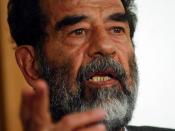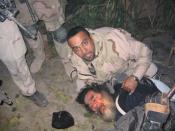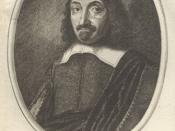As a mathematician, Descartes was wholly convinced that he could determine all truth through a deduction process from a single fundamental principle. Descartes began by doubting absolutely everything in the hope of arriving at absolute truth and pure knowledge. Basically, in order to seek truth, it is necessary to doubt anything and everything that is capable of being doubted, consider it to be false, and then all that will be left over is the truth. All that is doubtful must be considered false. If something could not be doubted, he reasoned that it must be certain and true. He could then build on the foundation of certainty.
Descartes believed that first, one must not accept anything unless it is clear and distinct. He believed that next one should divide the problem into as many parts are necessary to solve it. Third, one must order thoughts from the most simple to the most complex.
Lastly, he believed that one must always check thoroughly for oversights.
Descartes believed that only that which is clear and distinct is true. But who determines clarity and distinction? How can we be certain that Descartes' definitions for clear and distinct are true? Shouldn't we doubt his definition and dismiss them as doubtful and therefore false? What if what he considers clear and distinct is what I consider ambiguous and doubtful? For example, President Bush 'clearly and distinctly' believed that Iraq had weapons of mass destruction. The government had spy plane footage of suspicious military mobilization, testimony from Iraqi scientists, statements from former members of Saddam's regime, and much more that would make a rational person such as President Bush believe that WMDs were present in Iraq and that the US Military and the CIA knew precisely where to find them; however, all of them were...


